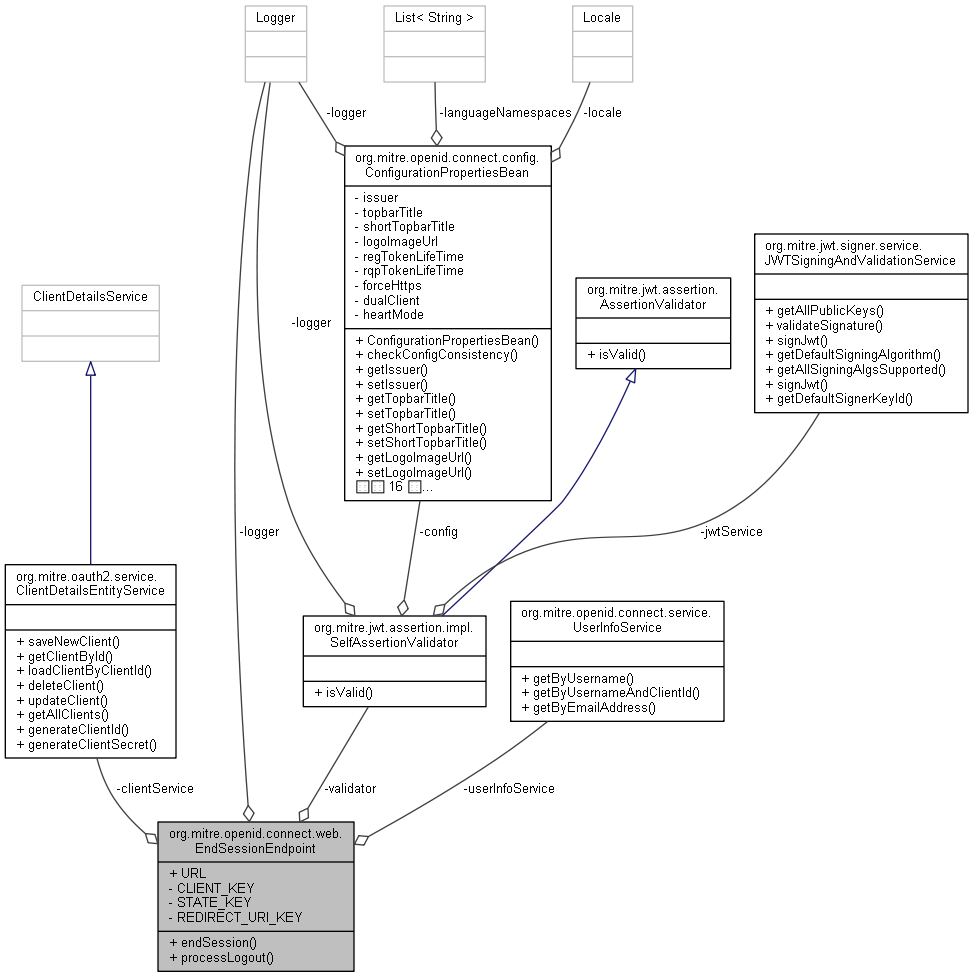org.mitre.openid.connect.web.EndSessionEndpoint 連携図

公開メンバ関数 | |
| String | endSession (@RequestParam(value="id_token_hint", required=false) String idTokenHint, @RequestParam(value="post_logout_redirect_uri", required=false) String postLogoutRedirectUri, @RequestParam(value=STATE_KEY, required=false) String state, HttpServletRequest request, HttpServletResponse response, HttpSession session, Authentication auth, Model m) |
| String | processLogout (@RequestParam(value="approve", required=false) String approved, HttpServletRequest request, HttpServletResponse response, HttpSession session, Authentication auth, Model m) |
静的公開変数類 | |
| static final String | URL = "endsession" |
非公開変数類 | |
| SelfAssertionValidator | validator |
| UserInfoService | userInfoService |
| ClientDetailsEntityService | clientService |
静的非公開変数類 | |
| static final String | CLIENT_KEY = "client" |
| static final String | STATE_KEY = "state" |
| static final String | REDIRECT_URI_KEY = "redirectUri" |
| static Logger | logger = LoggerFactory.getLogger(EndSessionEndpoint.class) |
詳解
Implementation of the End Session Endpoint from OIDC session management
関数詳解
◆ endSession()
|
inline |
UserInfoService userInfoService
Definition: EndSessionEndpoint.java:74
static final String CLIENT_KEY
Definition: EndSessionEndpoint.java:64
SelfAssertionValidator validator
Definition: EndSessionEndpoint.java:71
ClientDetailsEntityService clientService
Definition: EndSessionEndpoint.java:77
String processLogout(@RequestParam(value="approve", required=false) String approved, HttpServletRequest request, HttpServletResponse response, HttpSession session, Authentication auth, Model m)
Definition: EndSessionEndpoint.java:155
UserInfo getByUsername(String username)
static final String STATE_KEY
Definition: EndSessionEndpoint.java:65
static final String REDIRECT_URI_KEY
Definition: EndSessionEndpoint.java:66
ClientDetailsEntity loadClientByClientId(String clientId)
boolean isValid(JWT assertion)
Definition: SelfAssertionValidator.java:52
static Logger logger
Definition: EndSessionEndpoint.java:68
◆ processLogout()
|
inline |
174 // if the user didn't approve, don't log out but hit the landing page anyway for redirect as needed
187 UriComponents uri = UriComponentsBuilder.fromHttpUrl(redirectUri).queryParam("state", state).build();
static final String CLIENT_KEY
Definition: EndSessionEndpoint.java:64
static final String STATE_KEY
Definition: EndSessionEndpoint.java:65
static final String REDIRECT_URI_KEY
Definition: EndSessionEndpoint.java:66
メンバ詳解
◆ CLIENT_KEY
|
staticprivate |
◆ clientService
|
private |
◆ logger
|
staticprivate |
◆ REDIRECT_URI_KEY
|
staticprivate |
◆ STATE_KEY
|
staticprivate |
◆ URL
|
static |
◆ userInfoService
|
private |
◆ validator
|
private |
このクラス詳解は次のファイルから抽出されました:
- D:/AppData/OpenId/mitreid-connect/src/openid-connect-server/src/main/java/org/mitre/openid/connect/web/EndSessionEndpoint.java
 1.8.13
1.8.13